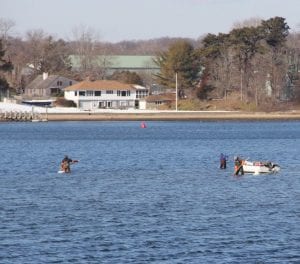By Judy Benson

While the pandemic curtailed many favorite activities, recreational shellfishing remained popular and even surged in many shoreline towns last year.
“Clamming is a very COVID-friendly activity,” said Peter Harris, chairman of the Waterford-East Lyme Shellfish Commission. “You’re outside, you have a nice long rake so you stay socially distanced, and you get a nice food source.”
More than 500 shellfishing permits sold in 2020 for the WELSCO beds in the Niantic River – about the same number as in 2019, but COVID concerns did have an impact. One of the most popular areas had to be closed because too many boats were congregating there, creating a “party atmosphere” that wasn’t safe, he said. Finding a way to safely sell permits also proved challenging.
Similar stories of strong interest in shellfishing in 2020 along with unique challenges presented by the pandemic were heard from representatives of the 12 commissions that attended the Annual Meeting of Shellfish Commissions on Feb. 13. Usually conducted in-person, this year’s virtual meeting brought together about 35 of the volunteers who serve on municipal commissions along with scientists, regulators and extension specialists from the state Department of Agriculture Bureau of Aquaculture and Connecticut Sea Grant.
The experts presented updates on monitoring programs for the various pathogens that can cause illnesses and force shellfish bed closures, a review of water sampling protocols and in-person inspections of areas being considered for new bed openings.
“We can now assess mooring areas differently, and we may be able to create opportunities in some new areas,” said Alissa Dragan, environmental analyst at the Bureau of Aquaculture. “Our goal is to have one or two new areas opened in the next year.”
Before inviting each of the commissions to report on the past year, Tessa Getchis, aquaculture extension specialist at Connecticut Sea Grant, shared some of the projects underway or being considered to advance awareness and collaboration about recreational shellfishing. Those include the possible creation of an association of shellfish commissions and a shared online platform where members of different commissions could share information. An analysis of the impact of economic impact of recreational shellfishing is in the works, she added.
“We want to show how important the sector is and how important your work is,” she said.